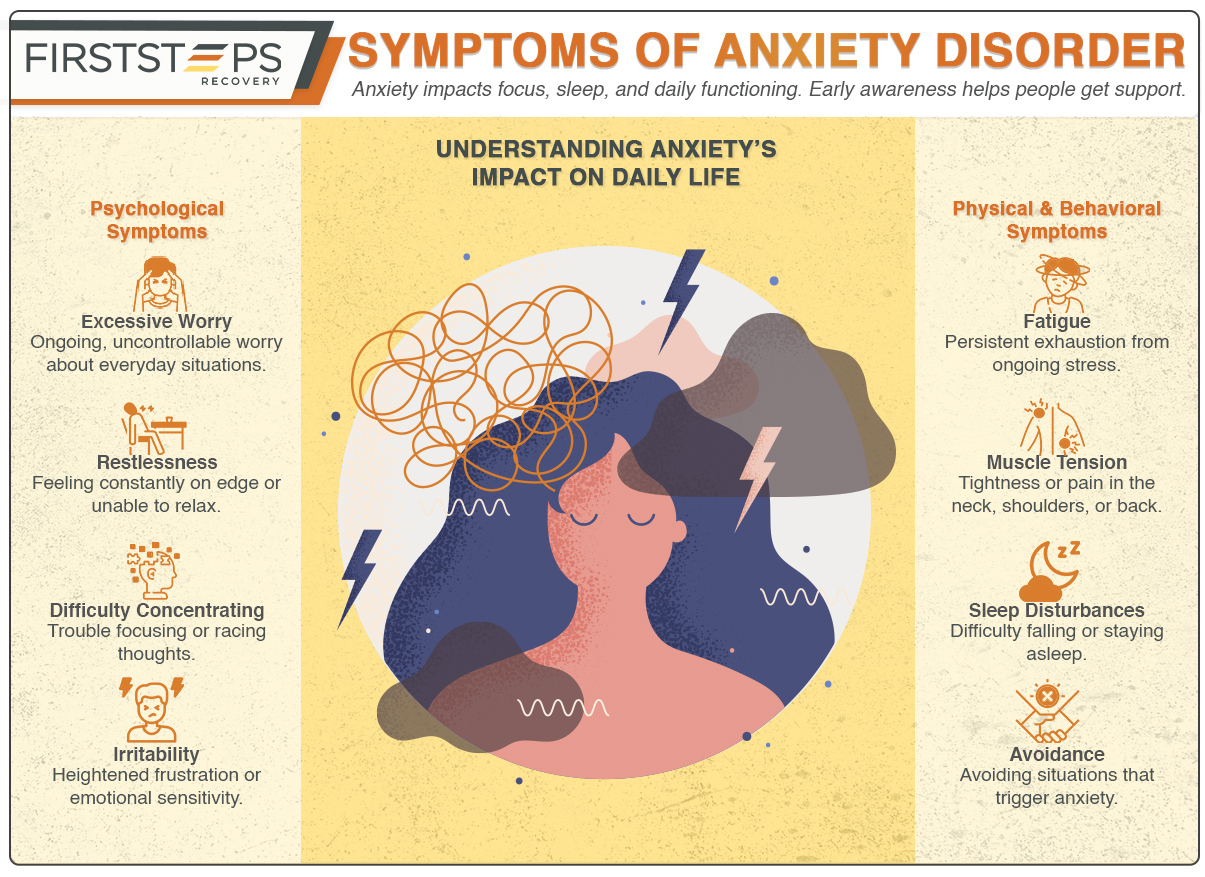At First Steps Recovery in Clovis, CA, we understand that the journey to overcoming addiction often involves addressing underlying mental health issues like anxiety. Our comprehensive treatment programs are designed to provide holistic, personalized care that targets both addiction and anxiety. We offer a safe and supportive environment where individuals can begin their journey towards lasting recovery and wellness.

Anxiety and addiction frequently coexist, creating a complex web that can be challenging to untangle without professional help. Understanding the intricate relationship between these two conditions is crucial for effective treatment and long-term recovery.
One of the primary ways anxiety and addiction intersect is through self-medication. Individuals suffering from anxiety may turn to substances like alcohol, prescription medications, or illicit drugs as a means to alleviate their symptoms temporarily. Alcohol, for example, may provide short-term relief by dampening the nervous system. However, over time, this behavior can lead to dependence and addiction to alcohol, as the brain becomes reliant on it to manage anxiety symptoms.
Substance abuse can exacerbate or even trigger anxiety disorders. Certain drugs, particularly stimulants like cocaine and methamphetamine, can increase anxiety levels and contribute to the development of anxiety disorders. Even substances commonly perceived as calming, such as marijuana, can lead to increased anxiety and paranoia in some individuals (especially with long-term use).
Individuals may use substances to cope with anxiety, leading to dependence and increased anxiety when not using the substance. Withdrawal symptoms can further intensify anxiety, perpetuating the cycle of use and dependence. This cycle can be difficult to break without professional intervention.
Both anxiety disorders and addiction have genetic components. A family history of either condition can increase an individual’s risk of developing the other. Additionally, environmental factors such as trauma, stress, and early exposure to substances can contribute to the development of both anxiety and addiction.

Recognizing the signs and symptoms of an anxiety disorder is a critical first step in seeking help. Anxiety disorders can manifest in various ways, and individuals may experience a wide range of symptoms that impact their daily lives.
Psychological symptoms of anxiety may include:
Physical symptoms may include:
Behavioral symptoms of anxiety may include:
If you or a loved one is experiencing these symptoms alongside substance use, it’s essential to seek comprehensive treatment that addresses both conditions simultaneously. Early intervention and treatment can prevent the worsening of symptoms and improve overall quality of life.
Dual diagnosis treatment is designed for individuals who are struggling with both a mental health disorder and substance use disorder. At First Steps Recovery, we specialize in dual diagnosis care, ensuring that each client receives a tailored treatment plan that addresses their unique needs.
Our dual diagnosis treatment includes:
By treating both conditions concurrently, dual diagnosis treatment aims to break the cycle of addiction and anxiety, leading to more sustainable recovery outcomes.

Therapy is a cornerstone of our treatment approach at First Steps Recovery. We offer a variety of therapeutic modalities to help clients manage anxiety and overcome addiction, including:
Therapists that specialize in addiction are trained to address the specific challenges associated with anxiety and addiction, providing compassionate and effective care.
For some individuals, medication can be a valuable component of their treatment plan. Our medical team at First Steps Recovery is experienced in managing medications for both anxiety and addiction, ensuring that clients receive the most appropriate and effective pharmaceutical interventions.
Medication management may include:
We closely monitor each client’s response to medication and make adjustments as needed to optimize treatment outcomes.
At First Steps Recovery, we believe in treating the whole person, not just the symptoms of their disorder. Our holistic approaches to recovery incorporate various therapies and activities designed to promote overall well-being, including:
These holistic therapies complement traditional treatments, providing a well-rounded approach to recovery.
Family support is a critical component of successful recovery. At First Steps Recovery, we encourage family involvement through our comprehensive family programs. These programs aim to educate family members about addiction and anxiety, improve communication, and rebuild trust within the family unit.
Our family support services include:
By involving families in the treatment process, we help create a stronger support system for our clients, enhancing their chances of long-term recovery.
Recovery is a lifelong journey, and aftercare is essential for maintaining sobriety and managing anxiety post-treatment. At First Steps Recovery, we offer robust aftercare programs designed to support clients as they transition back into their everyday lives.
Our aftercare services include:
By providing continuous support, we help our clients build a solid foundation for sustained recovery.
Taking the first step towards recovery can be daunting, but our team at First Steps Recovery is here to guide you through the process. To get started with treatment:
We are committed to providing compassionate, individualized care to help you achieve lasting recovery.
If you or a loved one is struggling with anxiety and addiction, First Steps Recovery in Clovis, CA, is here to help. Our integrated treatment programs are designed to address the complex relationship between anxiety and addiction, offering a comprehensive approach to recovery. For more information on our programs, visit our Programs page.
First Steps Recovery is dedicated to providing the highest quality care for individuals facing the challenges of anxiety and addiction. Our experienced team, state-of-the-art facilities, and holistic approach ensure that you receive the support and treatment you need to succeed. Reach out to us today, and take the first step towards a brighter future.

From our certified therapists and nurses to our emotional support animal "Cooper", our entire team is dedicated to the health and success of our clients throughout our program and beyond.
Have questions about how our treatment programs works? Let's talk.
ADHD, or ADD, is a common neurodevelopmental disorder with attention and impulse control difficulties that can lead to substance abuse. Treatment with therapy and medication is crucial.
Anxiety disorder is a mental health condition characterized by excessive and persistent feelings of fear, worry, and apprehension that can significantly impact a person's daily life.
Bipolar disorder is a mental health condition characterized by extreme mood swings, including episodes of mania (elevated mood and energy) and depression (low mood and loss of interest).
Depression is a mental health disorder characterized by persistent sadness, loss of interest, and other emotional and physical symptoms
An eating disorder is a mental health condition characterized by abnormal eating habits. Getting help is important to address physical and psychological health risks, improve quality of life, and promote recovery.
Personality disorder is a mental health condition characterized by unhealthy patterns of thinking, behaving, and relating to others. Getting help is crucial to improve relationships, coping skills, and overall well-being.
PTSD (Post-Traumatic Stress Disorder)/Trauma disorder is a mental healtah condition resulting from experiencing or witnessing traumatic events. Getting help is important to process trauma, reduce symptoms, and improve overall quality of life.
Schizophrenia is a mental health disorder characterized by hallucinations, delusions, and disorganized thinking. Getting help is vital to manage symptoms, improve functioning, and enhance overall quality of life.
Have questions about our substance abuse treatment programs? Let’s talk.
Dayatra L.
Melissa B.
Bruce G.
Have questions about how our alumni program works? Let's talk.










Have questions about First Steps Recovery? We're here to help.
© Copyright 2023 • First Steps Recovery • All Rights Reserved